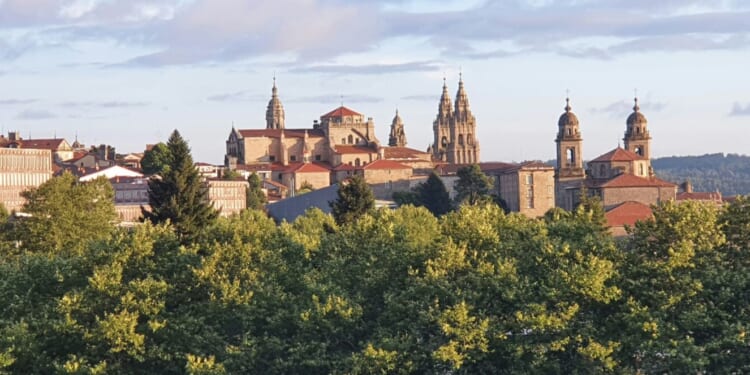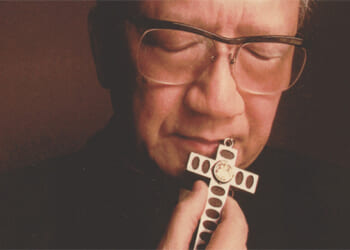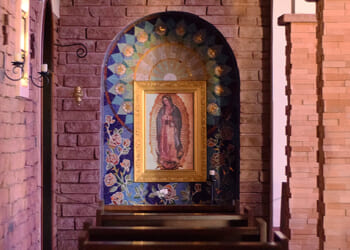The Spanish countryside blurred past my window as we rode the train from Madrid to Santiago de Compostela, a pilgrimage to the burial site of St. James the Greater. Across from me sat my two teenage children—my daughter listening to music through her noise-cancelling headphones, eyes closed; my son sleeping. Prior to boarding, we’d talked at length about the significance of where we were going and why. Now they were content to rest, leaving me to my thoughts.
I settled into my seat thinking I’d spend the next three hours contemplating St. James and his martyrdom, yet found my thoughts drifting to angels.
Over the last twelve months, I’d devoured Fr. Gabriele Amorth’s accounts of exorcism, absorbed St. John Paul II’s poetry, and worked through Dr. Brant Pitre’s biblical scholarship. Augustine’s Confessions sat dog-eared on the shelf behind my desk next to Ignatius’s Spiritual Exercises. Angels seemed fertile territory to explore.
I’ve thought often of those supernatural messengers devoted to God. What do they look like? How do they behave? What powers do they possess? What’s their relationship to humanity? I had theories from my reading, but I wanted a deeper understanding, the kind of insight that comes from focused contemplation.
God made me naturally curious, right? What harm could come from being curious about His creations?
The reply came the moment I finished the thought: “You’re made to be curious about Me.”
That’s usually how the Lord communicates with me. Sudden and direct.
“But angels were made by You,” came my internal retort. “They are good, because all things made by You are good. What bad could come from thinking of them?”
The reply, more feeling than word, materialized before my next breath: “Focusing on angels would be like dwelling on how the ink was made rather than reading the message. The ink process may be interesting, but what you’re made to ponder isn’t contained in the ink, but in the words the ink reveals.”
Outside my window an endless sea of wheat fields stretched to the horizon, broken by ancient stone walls. The occasional village church spire pointed skyward like a finger toward heaven. I watched a farmer in the distance, bent over his work, completely unaware of my train passing by. How many times, I wondered, had I been like him, so focused on the ground beneath my feet that I missed the bigger story rushing past?
A smile tugged at my lips as I saw what was happening. Inside and out. The parallel was perfect.
This is what I’ve come to understand as the grace of recognition: when God answers not just philosophically, but viscerally, using the world around us as His blackboard.
I felt that my thoughts were now oriented in the right direction. Angels are the medium through which divine communication flows, so of course, they are important, but fixating on the medium can cause me—us—to miss His message. It’s similar to how someone might become so fascinated by the mechanics of how a telescope works that they forget to look through it at the stars.
How often had I focused on the medium that I’d missed the message? How many times had I become so fixated on understanding the mechanics of faith—counting Hail Marys, the right words for novenas, proper posture at Mass—that I’d lost sight of the One at its center? The questions stayed with me through the remainder of our journey, coloring everything I saw as we approached the ancient city.
When we finally arrived at the Cathedral of Santiago, kneeling before the silver reliquary that holds St. James’s remains, I almost laughed at the recognition. Here I was, having traveled hundreds of miles to honor a saint, having just understood that dwelling on angels—God’s messengers—could distract from God’s message. And what was James but another messenger?
Around me, pilgrims waited in long lines, singing and praying, their faces radiant with devotion. And that’s when I understood the difference. They weren’t really venerating James the man, fascinating as he was—the fisherman who left his nets, who witnessed the Transfiguration, who brought the Gospel to Spain. They were honoring what he pointed toward. Who he died proclaiming.
James himself would be the first to redirect our gaze from his bones to our Lord. The saints, like angels, shine brightest not when we fixate on them but when we see through them to the One they served. They’re the ink that makes the Word visible to us.
We need the ink—the angels, the saints, the sacraments, each other—to perceive the Word. But we must remember to read what’s written, not just admire the quality of the letters.
Standing there in Santiago, I realized I hadn’t come to the end of a pilgrimage but to the beginning of understanding what pilgrimage means: traveling through messengers to reach the Message.
Photo by Fernando Lazaro Diaz on Unsplash










